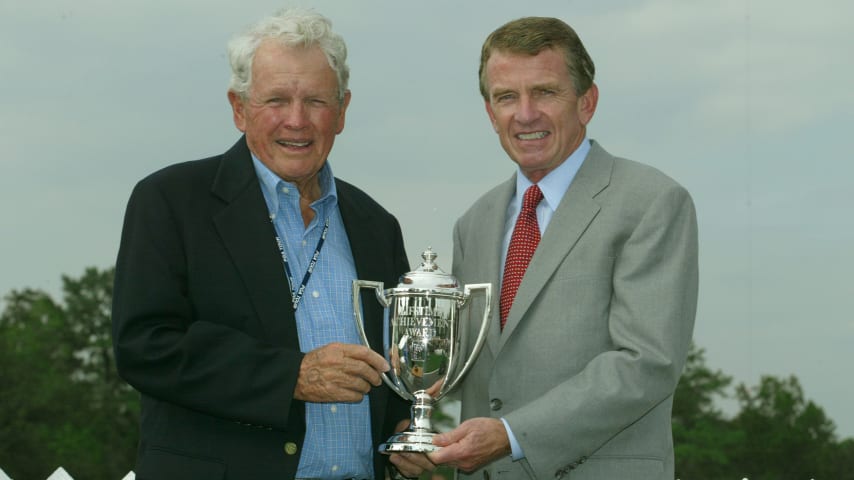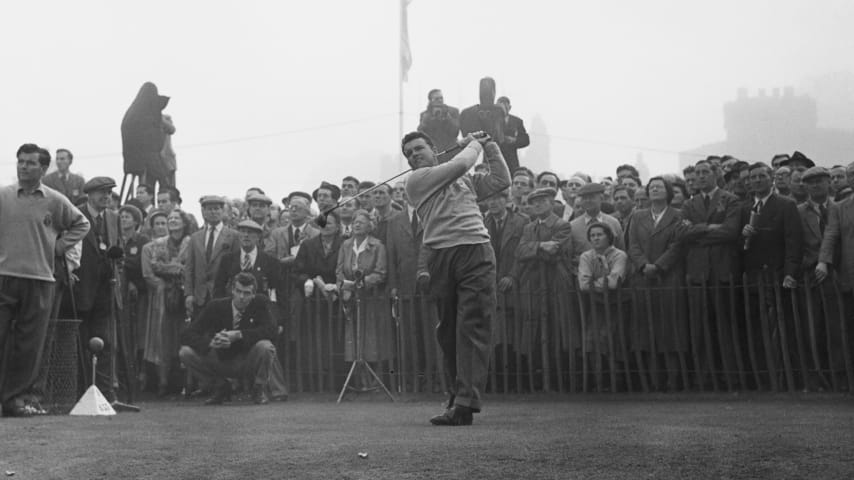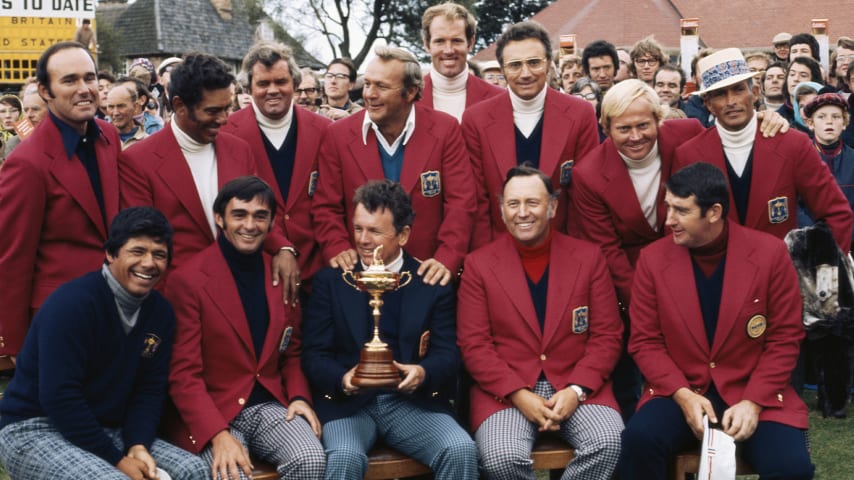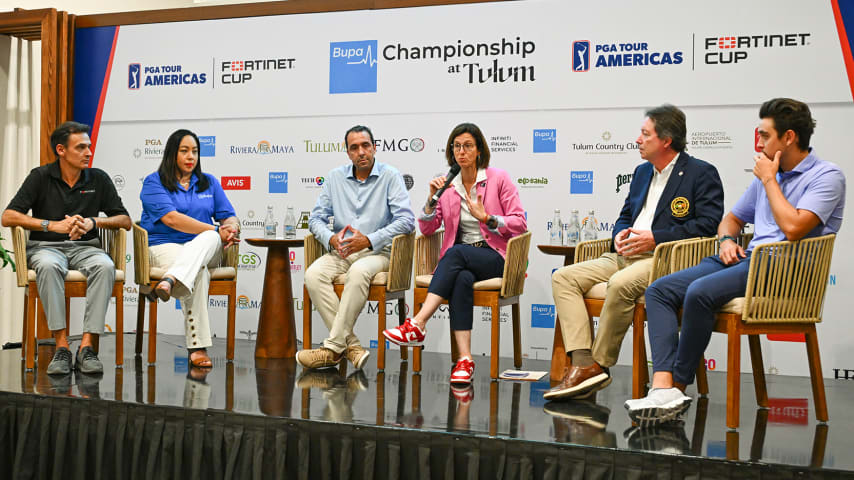Two-time major winner Jack Burke Jr. dies at 100
11 Min Read

Celebrating the life and career of Jack Burke Jr.
Written by Jim McCabe
Editor’s note: Jack Burke Jr. passed away on Jan. 19, 2024. He was 100 years old. This obituary was published following his death. It’s being run again at the request of the Texas Children’s Houston Open as the tournament celebrates the two-time major championship winner this week. Although Burke was born in Ft. Worth, Texas, he spent most of his life in Houston, which is where he and fellow World Golf Hall of Fame member Jimmy Demaret founded the Champions Golf Club in the late 1950s.
Soften the music, remove your cap, lower flags at every green and raise a toast. Arguably the last bridge connecting us to that bygone era of professional golf filled with shot-making wizardry, colorful characters, hard-scrabble courses and diabolical stymies is no longer opened.
Jack Burke Jr., whose two major championship wins were achieved in 1956 but who remained one of the game’s grandest sages for another six decades, died Friday, Jan. 19.
He was 100, reaching the century mark on Jan. 29, 2023, and was the oldest living member of the World Golf Hall of Fame, where he was enshrined alongside so many of the game’s icons with whom he had close friendships.
He learned from Craig Wood, sat within Ben Hogan’s small circle of friends, competed against Sam Snead and was in business with Jimmy Demaret. He also beat them, winning 16 total TOUR titles. He was, quite simply, a slice of Americana. Raised during the Great Depression, he was not college-educated, just wiser than a symposium of Ivy Leaguers; he didn’t just take your calls and answer questions, he regaled you, enlightened you, entertained you.
Burke told truth as effortlessly as Sinatra sang saloon, delivering it with the speed and force of a Joe Louis jab. “He’s so blatantly honest,” Hal Sutton once told Sports Illustrated. For example, from a “My Shot” column in Golf Digest: “The game is growing, all right – just look at the stomach of your basic country club member. The emphasis on food in clubs is just unbelievable. The chef is praised or vilified more than the head pro.”

Celebrating the life and career of Jack Burke Jr.
“Jackie Burke was a true Hall of Famer who will always be remembered for the style and grace with which he played the game and ran Champions Golf Club," said PGA TOUR Commissioner Jay Monahan. "It’s hard to measure the impact he had on the game, and his willingness to mentor and help players is legendary. I’ve admired Jackie and all he has meant to professional golf, and we mourn his death and send our condolences to his family.”
Former PGA TOUR Commissioner Tim Finchem had a close relationship with Burke during his 20-plus-year tenure leading the TOUR and maintained that friendship even after he retired.
“Jackie was always there for me as a mentor and a counselor," said Finchem. "I relied on his wisdom often when a difficult problem confronted me. His contributions to our sport are innumerable, and we have lost a great friend and champion."

Jack Burke Jr. (left) with former PGA TOUR Commissioner Tim Finchem after being presented with the PGA TOUR's Lifetime Achievement Award in 2003. (PGA TOUR Archives)
It’s safe to say that golf was in Burke’s DNA and that eventual honors such as the World Golf Hall of Fame (inducted, 2000) and PGA of America’s Distinguished Service Award (2007) were his destiny. He first played at 4, first broke par at 12, and was involved in matches against adults such as Babe Didrikson Zaharias as a teenager.
He credited good pedigree.
Born in Fort Worth, Texas, John Joseph Burke Jr. was the son of a professional golfer. Jack Burke Sr., a two-time TOUR winner, hailed from Philadelphia but eventually made his fame as a club pro in Texas, mostly at River Oaks in Houston.
There, the elder Burke earned a reputation as a leading authority on the golf swing, mentoring such legendary players as Byron Nelson and instructors like Jack Grout, who later gained fame as Jack Nicklaus’ coach; Harvey Penick, who taught Mickey Wright, Kathy Whitworth, Ben Crenshaw and Tom Kite; and Claude Harmon, whose four sons (Butch, Craig, Dick and Billy) became heralded instructors.
The symmetry within Jack Burke Jr.’s golf world could always be owed to his father, “who taught me more about golf than anyone.”
One of his father’s early assistants was Demaret, who eventually became a three-time Masters champion, but spent much of his formative years at River Oaks where he “babysat” Burke Jr., 13 years younger. It forged a lifetime of friendship and partnership as Burke Jr. and Demaret built Champions Golf Club in Houston in the late 1950s.
Burke Sr. grew up in Philadelphia and he and his siblings moved in with cousins – the Marr family – when their parents died. That cemented a strong friendship between Jack Burke Sr. and Dave Marr Sr. When Marr died in 1948, Burke, 10 years older, looked after his son, Dave Marr Jr., and thus the duo became close with Burke assuming a big-brother role. Always, Jack Burke Jr. would refer to the late Dave Marr Jr. – the 1965 PGA Champion – as “cuz.”
“I was raised in a good house,” Burke told Golf Digest’s Guy Yocom. “The worst luck someone can have is coming up in a bad house. It can be too much to overcome. Remember that when you look around.”
With his father’s blessing, Burke turned professional at age 17, but after a few years he chose to serve a stint in the Marines. When he got out, he became an assistant pro under Claude Harmon at Winged Foot and started to polish his game. “I was just happy I didn’t have to go back in the Marines,” Burke said.

Jack Burke Jr. drives his ball from the first tee at the 1953 Ryder Cup at the Wentworth Club. (PGA TOUR Archives)
One of his tasks at Winged Foot was to look after Claude Harmon’s boys when they came on property. “I used to babysit Butch Harmon and his brothers, so I took them onto the golf course,” he laughed years later. “Now that was a tough job.”
He became head professional at Metropolis Country Club in Fairview, New York, played a handful of PGA TOUR events from 1947-49. Then in 1950 he made a huge splash as a full-time “touring” professional. His maiden victory is notable for the venue – Pebble Beach, known at the time as the Bing Crosby Professional-Amateur – and for the fact he shared first place with Sam Snead, Smiley Quick and Dave Douglas. There were three other victories in ’50, then in ’52 Burke established himself as one of the game’s best. He won five times, including four in a row, a stretch during which he went 60 under and averaged 67.75 per round.
Burke won the Vardon Trophy that season and piled up 16 wins in a 14-year career. But it was in 1956 that Burke cemented his legacy by winning the Masters and the PGA Championship and earning Player of the Year honors.
Burke’s win at Augusta National is memorable for the eight-stroke deficit he made up on Ken Venturi, still a record for largest comeback at that tournament. In the PGA Championship, then a match-play event, Burke rallied to beat Ted Kroll, 3 and 2, at Blue Hill Country Club in Canton, Mass.
His prize was $5,000 “and you weren’t sure if the check would bounce,” Burke told the Boston Globe in 1996. But making money wasn’t why he was into tournament golf back then. “Looking back, the part I enjoyed was just playing. Winning (and the prize money) just sort of happened.”
Beyond his 16 wins, Burke finished second 21 times and played in four Ryder Cups, where his only loss in eight matches came as playing-captain in 1957. Burke said he’d intended just to play a foursomes match (he won with Ted Kroll) when one of his players became ill and couldn’t make his singles match. Dai Rees (the opposing captain) refused to halve the game, so Burke said, “I just took off my suit jacket and tie and played.”
He lost to Peter Millis and the Americans were beaten for the first time since 1933.
Burke made the 1959 team, but did not play, then he received a second shot as captain in 1973, guiding the Americans to a win at Muirfield. His final time as a member of the U.S. Ryder Cup team came in 2004 when at the age of 81 he was one of Sutton’s vice-captains.

Jack Burke Jr. holds the Ryder Cup trophy after captaining Team USA to a victory at Muirfield in 1973. (PGA TOUR Archives)
His biggest takeaway that year: How the game of pro golf had become so big and so rich. He was of the era of hard travel, soft purses, so at the age of 40, Burke decided to focus on Champions, which has two courses – Cypress Creek and Jackrabbit.
It’s as pure a golf club as you’ll find in the country. No pool. No tennis courts. No semblance of being a “country club.” Burke and Demaret wanted golfers who loved to play and play well. “It doesn’t make a lot of sense filling a yacht club with people who can’t sail a boat,” he said in Golf Digest.
The story is told of the time a wealthy oilman wanted a membership, only he was a 22-handicap. Burke refused his membership.
“Isn’t there anything I can do?” asked the man.
“Why, yes,” said Burke. “We have a school here. We have four instructors. You can sign up for lessons.”
The man did, and with his handicap lowered to 12, the club accepted him for membership.
On the Champions Golf Club website, Burke’s philosophy is attached: “60 years of golf and family life.” He wanted members who played golf and whose children would play golf. “If you’re not training kids, you’re not doing anything,” he told the Augusta Chronicle in 2012.
Burke also believed in opening the Champions Golf Club’s doors to the best tournament players, so it’s an impressive list of competitions that have been held there. A U.S. Open, a Ryder Cup, five TOUR Championships, the former PGA TOUR stop called the Houston Champions International, a U.S. Amateur, two U.S. Women’s Mid-Amateurs, two Southern Amateurs, and the annual Champions Invitational.
Country singer Clay Walker is a member at Champions and so was the late Apollo 14 astronaut Alan Shepard, one of three club members who walked on the moon. Burke prominently displayed a photo of Shepard swinging a makeshift 6-iron on the moon. “Warmest personal regards for your great help with my ‘lunar swing,’” Shepard wrote on his autograph.
Shepard, who died in 1998, epitomized the respect and love people had for Burke. A “roast” in Burke’s honor in 2000 was covered by Ivan Maisel of Sports Illustrated, who wrote that Butch Harmon surveyed a crowd of 900 guests and quipped: “How many people do you think you’ve pissed off all these years? They all showed up.”
Crenshaw that night heard Burke described as a man with ice-blue eyes. “More ‘ice’ than ‘blue,’ ” Crenshaw told the audience, wrote Maisel.

Ben Crenshaw remembers Jack Burke Jr.'s legacy
Feisty and strong-willed, Burke was a martial arts instructor in the Marines and at age 78 he achieved his black belt in karate. But to the many lives he touched within golf, Burke was admired for his ability to teach the game, to preach life, to speak truth. He was swing coach and godfather to Nathaniel Crosby, Bing’s son and the 1981 U.S. Amateur champion. Phil Mickelson sought out Burke for putting lessons. Steve Elkington came to the University of Houston from Australia and in Burke found a mentor for life. Sutton considered him like a father.
Sutton told a story once about his days as a hot-shot amateur. He asked Burke, his instructor, what his rookie year might be like on the PGA TOUR.
Burke pushed Sutton, who was off balance and stumbled badly.
“That’s what the TOUR is going to be like,” Burke told him.
“If you didn’t want to hear the truth, then you didn’t ask Jack Burke a question,” said Sutton.
Burke and his first wife, Eileen, who predeceased him, had five children. He is survived by his wife, Robin, and their daughter, Meghan.
Burke met Robin (Moran) when she came for putting lessons while a member of the golf team at the University of Texas. Burke often quipped that “I never did teach her to putt, but I fell in love.” They married in 1987 and shared a love of golf. Robin lost in the finals of the U.S. Women’s Amateur in 1997, served as captain of the Curtis Cup team in 2016, and was enshrined into the Texas Golf Hall of Fame, an honor that had been extended to her husband in 1979.
Beyond family members, survivors include a long line of Champions members, students, PGA TOUR associates, and those in the golf fraternity who crossed paths and were left with indelible memories. Always, there’d be a parting pearl of wisdom from Jack Burke Jr., usually a swing tip, so, to celebrate his life, here is one last one from his Golf Digest “My Shot” column:
“When a primitive hunter threw a spear at his prey, you better believe he followed through and finished with his weight on his left foot. Reverse pivots in the jungle could be fatal. That saber-toothed tiger would eat you. Any throwing motion requires a weight shift to the left. Stone Age man realized that. Millions of years later, poor golfers do not.”
He lived well, played well, and wanted the same for you.












